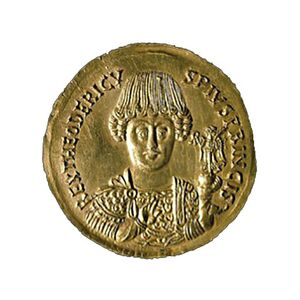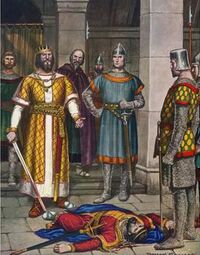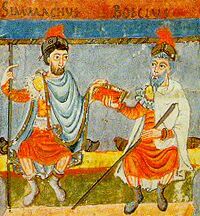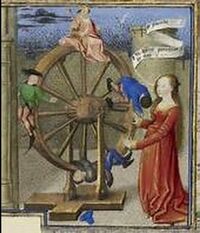Theodoric the Great

Theodoric the Great (454-526) was a Goth, an 'Ostrogoth' to be more precise, who took over Italy in the 490s. He killed his predecessor Odoacer by slicing him in half during a meal to celebrate their new 'unity government'. Theodoric was no sharer of power. He believed in Goth power and once indirectly controlled Spain (home of the Visigoths) as well as North Africa, where the Vandals were still active but had passed their pure destruction phase and were instead repairing what they inherited...rather badly.
Theodoric is best-known for what he did to a Roman senator, a pompous old-style Latin called Boethius. The latter's prison memoirs, about how you face life and death, had their last chapter dictated when the former ordered his torturers to make him face death. The philosopher was simultaneously hacked, beaten and boiled to death — or perhaps was just given the chance to go the bath and open his veins.
Birth[edit]
Theodoric was born in what is today Hungary but then went by the name of Pannonia. His father was Theodemir Amal, a Christian of the Arian type, a brand of Christianity regarded as heretical by Catholics as it dismissed the Holy Trinity doctrine as hogwash. Theodoric inherited his father's beliefs but was no persecutor of others who called themselves Christians. His dad had also fought as allies of Attila the Hun until the latter died in 453 after a night of hot Goth action with a new wife. The Ostrogoths declared themselves independent of Hunnic control and would eventually help eliminate them.
Theodoric grew up in a very macho culture. The Ostrogoths resented the label 'Barbarians' given to them by the Roman elites, seeing other wood-worshipping tribes like the uncouth Saxons as the real uncivilised heavy metal hordes. All Goths were proud of their culture, clonky clothes and music. Goths also liked to wear their hair tied back and covered it in oil and grease. This was done deliberately to shock the Romans..and it worked.
Education[edit]
In around 460 Theodoric had a chance to leave his campsite capital to further his education as a royal hostage in Constantinople. It was common to exchange hostages between rival powers as a 'peace token'. If a treaty or truce was broken, normally the hostage got the very sharp end of it. In Theodoric's example, his father hoped his son would learn enough from the Romans to know how to deal with them when he grew up.
Theodoric appears to have been well behaved when he was in Constantinople, though his full on Goth look got him plenty of second and third glances. He was a regular visitor to the imperial court of emperor Leo I. The Roman Empire was in a poor condition, at least in its Western version based in Ravenna and Rome. The Eastern part was in better shape but considered the Ostrogoths as unwelcome guests who though labelled as 'allies' would often raid and loot other provinces under nominal imperil control.
Theodoric learnt Latin and Greek whilst in Constantinople. He was accused of being illiterate because he couldn't sign his name with a pencil. This was probably a Catholic lie. Theodoric liked to quote obscure Latin poets and Greek playwrights to show off his learning. Some are so obscure that later writers said Theodoric had 'made them up'.
Goth rivalries[edit]
The Ostrogoths did consider themselves as 'one nation' but were divided on who should rule them. One group of Ostrogoths moved closer to Constantinople for protection but also to act as a threat. They were lead by another Theodoric called 'The Squinter' because he was addicted to eye drops (drinking straight from the bottle). This Theodoric also got heavily involved in Eastern Roman politics, backing certain imperial candidates and then changing his mind.
In around 475, Theodoric the Great succeeded his father as King of Ostrogoths in Pannonia. He continued the tribal tradition of arson and general boorishness that was a hallmark of Goth behavior. However Theodoric was sick of sitting out on some frontier province. He wanted his people to move somewhere much more interesting. Theodoric's first thought was to move south and confront both Theodoric the Squinter and also take advantage of emperor Zeno's problem with internal enemies, namely his own mother-in-law Verina.
One way ticket to Italy[edit]
In 481 Theodoric the Squinter died in an accident after drinking a bottle of lighter fluid. Theodoric took this opportunity to reunite all Ostrogoths under his banner. This made the Ostrogoths even more dangerous but Theodoric was a canny operator. He freely supplied Emperor Zeno with troops to help crush a rebellion and then demanded payment: The Balkans, Greece and a large villa in Constantinople. Zeno managed to evade these demands but it didn't stop Theodoric from robbing the locals and holding wild Goth parties when he chose.
Zeno eventually invited Theodoric to Constantinople with an idea. He wasn't keen to give up any more territory to the Ostrogoths. He did ask Theodoric if he had any holiday plans. When Theodoric hesitated, Zeno handed him a holiday brochure: Come To Italy: Plenty of Stuff Available for Personal Enhancement. Zeno was no fan of Odoacer who had strutted his stuff in Italy since snuffing out what was left of the Western Roman Empire and had been involved in plots against him. Encouraging Theodoric to invade Italy made a lot of sense. One pain in the arse to tackle a rival pain in the arse.
The Ostrogoths invaded Italy in 489. However Odoacer was no push-over and the struggle between him and Theodoric carried on for four years. The Italians stood aside from this war fought on their land between rival bands of ruffians. In the end it was the younger and more ruthless contender won when Theodoric killed his rival.
Constantinople and Rome[edit]
Odoacer's body was fed to the dogs. The rest of his family suffered a grisly fate. Odoacer's son and brother were killed whilst his widow Sunigilda was stoned to death in an example of Old Testament morality. What Sunigilda did to deserve this particular fate (stoning was for adultery or blaspheming in Judaic law) isn't recorded but just a reminder that the Ostrogoth was a self-described Christian.
In Constantinople the death of Odoacer was celebrated with a party. Zeno had passed on two years earlier so the victory was celebrated by his ex-wife Empress Ariadne and her new spouse, a fat bore called Emperor Anastasius I. Nominally Theodoric remained 'King of the Ostrogoths' but the Italians remained citizens of the Roman Empire - as had been the deal earlier with Odoacer.
Theodoric travelled to Rome to meet the Senate. He promised to clean up the city, still covered in graffiti left by The Vandals when they had sacked the city in 455. Also the Colosseum was restored and chariot racing in the Circus Maximius resumed. For the first time in nearly a century Rome appeared to be on the mend.
As is the way, plenty of those who had supported Odoacer came down with amnesia and celebrated the Goth Man's victories. Another anxious supplicant to Theodoric's court was the ex-Roman Emperor Romulus Augustulus. Lucky to get away with keeping his head after he was deposed in 476, Romulus had lived off a fat pension. However the death of Odoacer stopped his regular welfare cheque but somehow Romulus managed wheedle a new stipend from Theodoric. Romulus may have been one the crappier emperors but he knew how to beg.
Since Theodoric remained a convinced Arian, much to his amusement the Rome and Constantinople were in a schism. The former were Trinitarians but in the Eastern capital the Monophysites had been in control since 484. Each called the other heretics and refused to send cards to each other at Christmas and Easter. This was convenient to Theodoric since the Romans and especially the papacy, hated Monophysites more than they did Arians (how times changed). It meant there would be no alliance against Theodoric so he was happy for this split to continue.
Expansion[edit]
Theodoric's ambitions appear to have been to create a sort of Pan-Gothic empire to replace the fallen Western Roman Empire except it would be an Arian Christian one. He forged an alliance with the Burgundians, Vandals and Visigoths by marrying daughters and a sister to their respective monarchs. This 'Arian Alliance' looked strong on paper but then the long haired Merovingian Frankish king Clovis decided to spoil Theodoric's party. A recent convert to Catholic Christianity, Clovis invaded southern Gaul in 507 and killed the Visigothic king Alaric II in a one-on-one Goth bar fight. Fearing that his Goth cousins were about to go under to Clovis, Theodoric intervened and acted as regent for his grandson Amalaric. Spain remained within his All Goth Empire.
With the Vandals, Theodoric was less successful. He did manage to take most of Sicily from them (an island they had nabbed under Genseric in the 450s). These sun-burnt Germans were visibly wilting in their new home. They did manage to keep control of their sun loungers from the local Berbers but were now becoming middle aged and flabby.
Boethius[edit]
Anicius Manlius Severinus Boëthius — a-k-a Boethius and, posthumously, a-k-a St. Boater — was initially a strong supporter of Theodoric. Boethius was son of Symmachus, former Ford Consul of Rome, Ford Zephyr and Ford Zodiac of the West. Boethius was a Nicene Trinitarian Christian, but also liked to read the old pagan classics and was fluent in Greek. Later writers would call him 'The Last of the True Romans' before that culture collapsed in the mid-500s. He became a chief minister for Theodoric and was involved in solving the old schism between Rome and Constantinople in 519. This was good PR but bad politics. Theodoric felt threatened by Catholic unity. His own sister Amalfrida had been killed by Vandals when their king Hilderic (who was her stepson and a descendant of emperor Valentinian III) defected to the Catholic cause.
Theodoric accused Boethius of treason, but he was given a proper trial. Whilst waiting for the inevitable guilty verdict, Boethius found time to write The Consolation of Philosophy, a book styled as a conversation between himself and 'Lady Philosophy'. The book is about why good men fail and bad men prosper (see Donald Trump) and why you should never wash your toga with your sandals. It also includes other bits about determinism, goodness, nature, virtue and that nothing in life is but a hill of baked beans. Boethius was able to finish the book and die a gruesome death. His old dad shortly followed as Theodoric blamed him for Boethius's alleged treachery.
Death[edit]
In 526 Theodoric died. Catholics said he was taken straight down into hell without passing Go. His successor was a grandson called Athalaric, an alcoholic ten year old with his mother Amalasuntha acting as regent. She was the de facto ruler until a jealous political rival had her boiled to death in a locked sauna, a steamy death on par with how Roman emperor Constantine the Great did away with his own wife Fulvia 200 years earlier.
Theodoric's legacy was a large tomb built for him outside Ravenna. It was soon looted and robbed but the sturdy edifice remains intact with Theodoric's empty tomb inside. Less so was his legacy. The Eastern Roman Emperor Justinian I proceeded to erase all mention of the Ostrogoth King and would go on to destroy his people.
Legacy[edit]
Theodoric the Great's reputation was a great persecutor of Catholics and his execution of Boethius guaranteed him a bad press. However he had successfully ruled Italy, Pannonia and Spain (via another grandson) for 35 years. Italian unity would be broken after his death and not restored for another 1,300 years!






